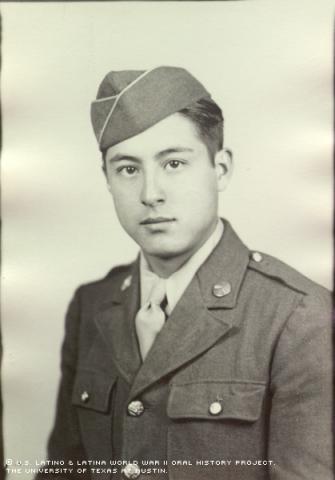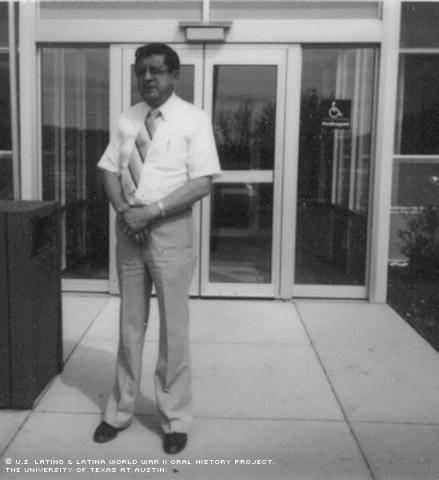

By Miguel A. Castro
When it came to his safety, Salvador Valades knew he could always rely on his mother's prayers.
I really don't know what she prayed over us, but I know I felt blessed," Valades said.
As a young man, on the morning of March 13, 1945, he felt that her prayers saved his life. Valades' company, the 94th Infantry Division, was attempting to capture a concrete fortification in Germany located at the top of a hill. German forces defended their position with heavy fire.
"I was walking with the radio up the hill following the lieutenant when some of our troops had taken cover in a small dugout just on the left of us," Valades explained. "Since there was only minimal protection, we incurred several casualties, including some deaths."
As Valades and his lieutenant continued up the hill, they entered an area with some tree cover.
"Another burst of fire was heard and I had been hit with a single bullet in the chest area over my heart," Valades said. "This knocked me completely backwards and I landed on my back."
Eventually, a medic helped Valades down the hill to waiting stretcher-bearers.
"The bullet did not go through my back," Valades explained. "The bullet hit a bandoleer of ammunition I was carrying around my neck and chest and cut the crucifix from the Rosary that I had around my neck. I feel that this [the crucifix] had saved my life."
The rosary deflected the bullet away from his heart and it lodged, instead, in Valades’ liver. It was removed in a field hospital.
"The thing that I felt helped me more than anything was the prayers that my dear mother said over us each time that we were home and were leaving, while we were in the service," he said.
Valades' war experience would demonstrate to him the endurance of the human body. Later he’d return home and work in civil service for 36 years. He would also become a family man, marrying Darlene J. Houdek in 1951 and having three children.
His soldiering began early: He was an 18-year-old senior at Edgemont High School in Edgemont, S.D., living with his parents and four other siblings, when he was drafted into the Army. His father was a locomotive cleaner for the Burlington Railroad in Edgemont.
"We were instructed to report to the induction center in Ft. Snelling, Minn., in August of 1944," Valades said. "We knew we would be in the Army now!"
Valades said his parents weren’t happy about this because he was the youngest of three sons who were drafted to serve in World War II.
"My brother Vincent had been drafted December 17, 1942, and was already overseas in the Pacific," Valades said. "My [other] brother, Gabriel, initially was inducted into the Army Engineers, but later transferred to the Army Air Force." (Gabriel served from March of 1943 to March of 1946.)
After his induction, Valades was sent to Camp Roberts in California for 16 weeks of basic training. Valades said the thing he remembers the most about basic is how they often marched double-time with a full field pack and rifle on their backs in 110- to 115-degree heat.
"It was surprising how much the body could endure when required to do so," Valades said.
In late December of 1944, the basic training was cut short by three weeks and Valades was informed he would be sent to Europe.
"We were needed in Europe due to the many casualties that we were incurring, especially during the Battle of the Bulge in Germany," Valades said.
After his one-week trip overseas, he landed in Liverpool, England, and in the evening crossed the English Channel landing in La Havre, France. Valades was assigned to Company L of the 94th Infantry Division, attached tot he 3rd Army, "Old Blood and Guts Outfit," headed by General George S. Patton in Europe.
"We saw many ships that were sunk in the water," Valades said. "We saw signs of devastation in the area."
After his arrival in France, Valades and the other men were loaded onto cattle cars for a slow cold trip across France, all the way to the small isolated town of Metz, Germany.
"We noted that almost every home that we came across had a death notice, a letter edged in black, informing the family or those concerned that a son, husband or whatever had been killed in action," Valades said. "What a weird feeling. Not pleasant at all.
"This particular time was on the tail end of the Battle of the Bulge, so it was our responsibility to clear the way for the last push to the Rhine River, which had to be crossed. … There was still heavy fortification, as it was the Germans' last stand before retreating."
This brings Valades' story back to his near-death wound on the morning of March 13, 1945.
He was in the European war zone for about two months, in England, France and Germany.
"I was taken to a field hospital somewhere in Germany, where the bullet was removed," he said. "I ended up in England, where I was treated until I was returned to the United States."
When Valades returned to the U.S., he spent some time at a government hospital in Spokane, Wash., where he was further treated.
"I could not be discharged until I had enough points or time in the service," he said. "So I spent another year in the Army, which was rather enjoyable."
Valades was assigned to duty at Ft. Logan in Colorado in August of 1945, where he worked typing discharge papers and supervising German prisoners who repaired typewriters.
Upon his discharge on June 29, 1946, Valades was awarded medals for his skill as a sharp shooter and for good conduct. He received a European Theater Ribbon, a Purple Heart, a Combat Infantry Badge, a Bronze Star and the Victory Medal.
"Believe me, I was no hero, but I believe that my brother Vincent was," Valades said. "He received the Bronze Star while in combat. I wish that he was living so that he could give an account of some of his combat. He was a true hero in our books."
Vince Valades served in the Pacific from Dec. 17, 1942, to May 2, 1946, in the Army with the 41st Rainbow Division. He died of a heart attack in 1948.
After returning home, Valades said, he and his family were treated well by family and friends, with the exception of one person he remembers.
"There was one businessman in my hometown that often discriminated against me, but he never would tell me why!" he said.
After being discharged from the service, Valades attended and graduated from the National School of Business in Rapid City, S.D. He worked as a clerk typist at the Veterans Administration hospital in Ft. Meade, S.D., for 36 years, retiring in 1988 as Assistant Chief, Medical Administration Service.
"I feel that the service impressed upon me that it is necessary to get along with your fellow man, serve your country as necessary and at the same time serve God," he said.
Valdes has been active as a Catholic Eucharistic Minister for the homebound since his retirement.
"We must never forget to thank Him for the many graces he had bestowed on us, especially our parents, who with the help of His graces, brought us into this world as His children to serve Him in the best way we can."
Mr. Valades was interviewed in October of 2000 by Rea Ann Trotter.

